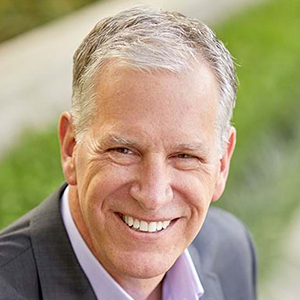

Actionable Allyship this International Women’s Day
I grew up around amazing women, who every day met the challenges of working while raising families. My grandmother Beth was a successful real estate agent, my grandmother Iola was a teacher, and my mother worked in retail sales selling microwave ovens. I saw first-hand how hard it was for both my grandmothers and mother to balance home and work. My mom would close the door on one working day and walk into a new to-do list of household chores—on top of looking after three boys, with our routine of schoolwork, after-school activities, and sports. Today, I have seen my working wife and three grown working daughters all challenged by the same issues. It’s clear we haven't seen the change we need to see in the world.
Change not only starts at home but also at work. Here at WE, I am glad women are leading this critical discussion, but men must participate as well. I was fortunate to have a very enlightening conversation with three of WE’s phenomenal women from around the world: Laura Gillen, WE’s Senior Director of Technology & B2B in the UK; Nicky Wang, WE Red Bridge’s Managing Director in China; and Neha Mehrotra, Avian WE’s EVP and National Head in India. They provided quantifiable actions and practical advice for men on how to become true allies and how all of us can help make meaningful and lasting positive change for women.
On working from home
Before the pandemic, what did you think needed to change for working women? Did that view change after the pandemic? If so, how?
Neha: Before the pandemic, flexible working was a dire need for women to succeed in their careers. Even though we are living in the 21st century, women are still the primary and, at times, even the sole caregivers in their families.
This means the responsibility of looking after children, parents and in-laws falls on them. In the absence of flexible hours, most women are forced to drop out of the workforce because they find it difficult to strike a balance between their work commitments and domestic duties.
Laura: The world of work has not got it right yet in terms of supporting mothers. In many cases, this was only heightened by the pandemic. Studies including this one from Deloitte back this up: 80% of women surveyed had had negative disruption at work, and 70% of that group felt their career growth may be limited!
Has the disruption opened opportunities for women to work remotely? If so, how?
Neha: Remote work has opened up a global talent pool. This is a great reset moment for women in PR, and it should encourage women who dropped out of the workforce due to family commitments to restart their careers. PR consultancies should also actively explore the possibility of hiring stay-at-home mothers who are talented but unable to join the workforce, as they cannot work in an office environment.
Laura: I think it has offered women the opportunity to set up working styles that suit them better. I have personally enjoyed the extra flexibility it has brought to my life—despite everything else!
On balance
How do you maintain balance during such a challenging time?
Nicky: I suffered chronic insomnia due to work-related stress and anxiety, and over the years have learned the hard way to find an approach that works for me.
In China, many of our clients are international and are based in different countries around the world. This means work literally doesn’t stop, as different parts of the world take turns to “wake up.” I have assigned an artificial “end of business” hour in the evenings, when I shut the Outlook app, put down my phone, and allow a couple of hours before bedtime when my brain is not occupied with work.
Laura: I am all about a long walk, some yoga and a podcast! It can be tough to prioritise sometimes, but it is so critical for my mental health and performance at work. Over the past year, I have found creating a routine is key for balance.
Neha: For the past year, I have been following a regimented lifestyle that has helped me stay motivated, focused and energetic. I stick to a routine—get up early, practice yoga, eat a healthy breakfast with my family, and start work after helping my little girl log in to her online classes. My advice to women working from home would be: Challenge your multitasking abilities and, while doing that, find time for yourself.
On gender equality
What does gender equality mean to you?
Nicky: Gender equality is a global issue with many layers of complications that require all leaders to be committed to making positive and tangible changes toward diversity and inclusion through our daily actions.
Neha: Society has favored men for so long that gender equality discussions always boil down to women’s liberation and empowerment. Although we must actively identify and redress the power imbalances between men and women, we must also include LGBTQ+ rights in our discussions because equality means recognising and embracing diversity.
Laura: It’s all about partnership. I am lucky enough to come from a family that has equality at the heart of it. I am also fortunate to have a partner where we come together 50-50. I realize that not everyone is as lucky. In the UK, there’s still a lot to do. We must continue to push for progress and as leaders look for ways that we can continue to build environments that offer opportunity for all—not just women!
What is the most important thing for men to understand about the experience of being a working woman today?
Laura: We all bring something different to the table. When we talk about equality it often assumes that we want women to be more like men. It is not that at all. We are all very different creatures, and it has been proven over and over again that more diverse teams (be it by sex, race or social status) deliver the best results.
Neha: When a woman joins the workforce, she comes with a strong desire to break stereotypes, change preconceived notions and make a mark. Remember her conviction to make things work is high, as she leaves behind a home that functions seamlessly because of her multitasking abilities. She may not have the time to engage in casual conversations at the water cooler or cafeteria or go out for a drink with her colleagues after work, but don’t judge her for that.
What do many well-intentioned male allies frequently miss or fail to see?
Neha: However well-intentioned they may be, they fail to put themselves in women’s shoes. Unless men know about our daily experiences, they can never become effective allies.
Even in the 21st century, women bear the larger share of the workload at home. For instance, 9 am may be when a male colleague starts work, but for the female colleague half the day is over as she woke up early to fix breakfast, get a head start on cooking, cleaning, and laundry, not to mention child duties—all before starting work. I am not saying that women should get preferential treatment for the amount of multitasking they do, but men need to be humble and more aware.
Nicky: I live in an equal household where my husband is a big advocate for female empowerment. I therefore look to his qualities to illustrate how male allies can show better support to their female colleagues and partners.
Share the burden. Be a supportive team player and share responsibilities at work and on household chores. Our household has a clear rule: If the dishes are dirty, just take care of it—whoever sees it first.
Laura: The perception of ‘red’ personality women in leadership can often be seen as harsh and unforgiving, whereas a man with a similar personality style is seen as direct and assertive. In addition, sometimes a woman’s passion can be misconstrued as emotional in a negative sense.
I believe these are steeped in systemic historical bias, and more progress and empathy are required. There is progress happening. As an example, this story shows how the UK government has finally recognised the need to modernise and support female cabinet ministers as mothers.
If male allies could do one thing to help working women in 2021, what would it be?
Nicky: Have open dialogues. Spend the time to listen and fully understand the challenges your female colleagues face. Only then will you become an effective advocate for women in all walks of life.
Neha: I hope men have developed a deeper understanding of the daily experiences of women, and this heightened situational awareness results in more empathy and eventually transforms their perspective about workplace discrimination.
Laura: I would challenge men to lean into their unconscious bias toward women. Stop and question themselves before making any assumptions about what they are capable of. We all have biases built into us one way or another, unfortunately. The important thing is to understand and learn from them.
The takeaway
Being an ally, isn’t a one and done solution.
It takes genuine and authentic effort and it needs to happen daily. My conversation with Neha, Laura and Nicky is just the beginning.
This conversation has taught me that an ally can show up in many ways. We can recognize when to step in and create an environment that allows an equal share of responsibility. We can also recognize when to step aside. We can read more and educate ourselves on experiences different from our own. And we should always listen.
To dive in more, take a look at these terrific books:
- Invisible Women by Caroline Criado
- Feminists Don’t Wear Pink and Other Lies by Scarlett Curtis
- We Should All Be Feminists by Chimamanda Ngozi Adichie
- Men Explain Things to Me by Rebecca Solnit
- Girl, Woman, Other by Bernardine Evaristo
I hope we will all pledge to empower women at home and at work, and I look forward to continuing this discussion with all genders at WE.
The latest blogs from WE
Decoding Gen Alpha: A Primer on the Next Gen of Consumers
Why Gen Alpha Will Fuel Spending This Season
Why Reputation Is a Business Driver in Healthcare


